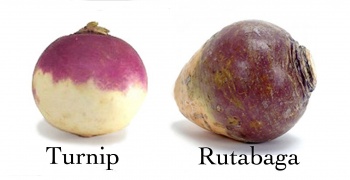Rutabaga
From Wikiwel
Other names : Swede, Swedish turnip, yellow turnip, neep, Brassica napobrassica, Brassica napus var. napobrassica, Brassica napus subsp. rapifera.
The rutabaga, a close cousin of the turnip, is a member of the cruciferous vegetable family. These mildly sweet root vegetables are larger, rounder and denser than turnips, and they sport a yellow peel with purple marking. Whether you cook rutabagas and serve them like mashed potatoes or eat them raw in a salad or as an appetizer with dip, adding rutabagas to your meal gives it a powerful nutritional boost.
See also : Cruciferous Vegetables
The rutabaga, a close cousin of the turnip, is a member of the cruciferous vegetable family. These mildly sweet root vegetables are larger, rounder and denser than turnips, and they sport a yellow peel with purple marking. Whether you cook rutabagas and serve them like mashed potatoes or eat them raw in a salad or as an appetizer with dip, adding rutabagas to your meal gives it a powerful nutritional boost.
See also : Cruciferous Vegetables
Special Precautions of Rutabaga
- Don't confuse with Turnip.
Health Benefits and uses of Rutabaga are
- Vitamin C : Your body's health depends heavily on vitamin C. It's necessary for the proper production of collagen, which is a vital component of connective tissue, and plays an important role in wound healing. Vitamin C also supports protein metabolism and neurotransmitter function. In addition, this powerful antioxidant helps protect your body from free radicals, which are unstable molecules that damage cell walls, thus reducing cancer risk. One small, 7-ounce rutabaga contains approximately 48 milligrams of vitamin C, which is approximately 80 percent of the daily value set by the U.S. Food and Drug Administration.
- Dietary fiber, a form of carbohydrate found in plant foods, is indigestible in the human digestive tract. It plays a vital role, however, in protecting against some types of cancer. Dietary fiber also helps lower blood cholesterol levels, control blood sugar levels and prevent constipation. A study reported in "Metabolism: Clinical and Experimental" in August 2012 noted that the health benefits of dietary fiber include prevention and mitigation of type-2 diabetes, cardiovascular disease and colon cancer. A 7-ounce rutabaga provides your body with 4.4 grams of dietary fiber, which is approximately 18 percent of the daily value set by the FDA.
- Hemorrhoids :Prepare a mixture of 50 ml each of carrot, spinach and rutabaga leaves juice.
- Potassium : The health benefits of potassium are numerous. This essential mineral helps activate enzymes necessary for carbohydrate and protein metabolism and synthesis. Potassium aids in maintaining your body's fluid balance and is vital for proper muscle contraction. An article published in "Physiologia Plantarum" in August 2008 noted that a high-potassium diet lowers blood pressure, helps reduce cardiovascular disease mortality and may decrease the risk of osteoporosis. One 7-ounce rutabaga contains 586 milligrams of potassium, which is approximately 17 percent of the daily value set by the FDA.
- Cancer : Cruciferous vegetables, such as rutabagas, are excellent sources of sulfur-containing substances called glucosinolates. These compounds are responsible for the bitter taste and pungent aroma of cruciferous vegetables. According to the Linus Pauling Institute, glucosinolates may help eliminate carcinogens before they can damage DNA or alter certain cell-signaling pathways. In turn, normal cells aren't transformed into cancerous cells.
